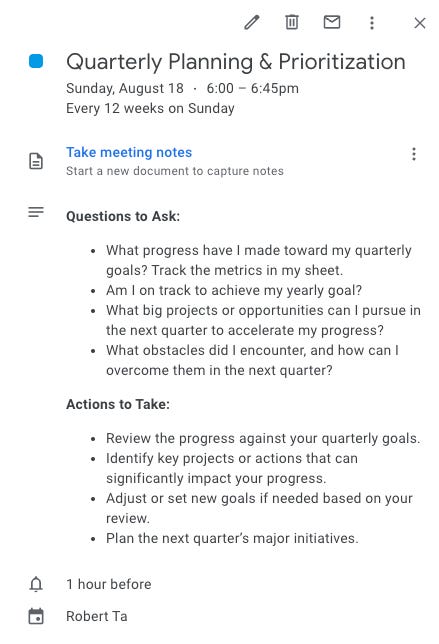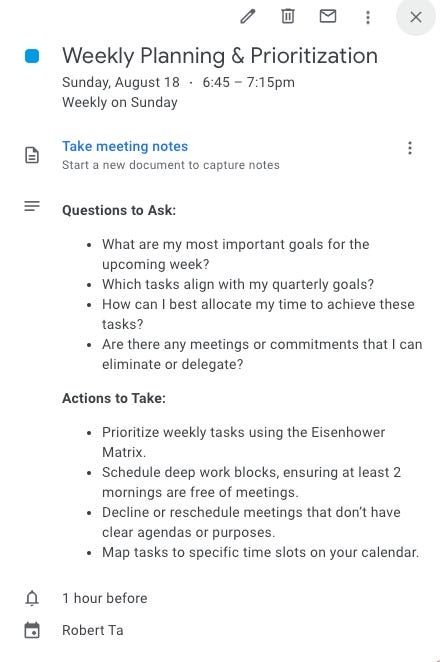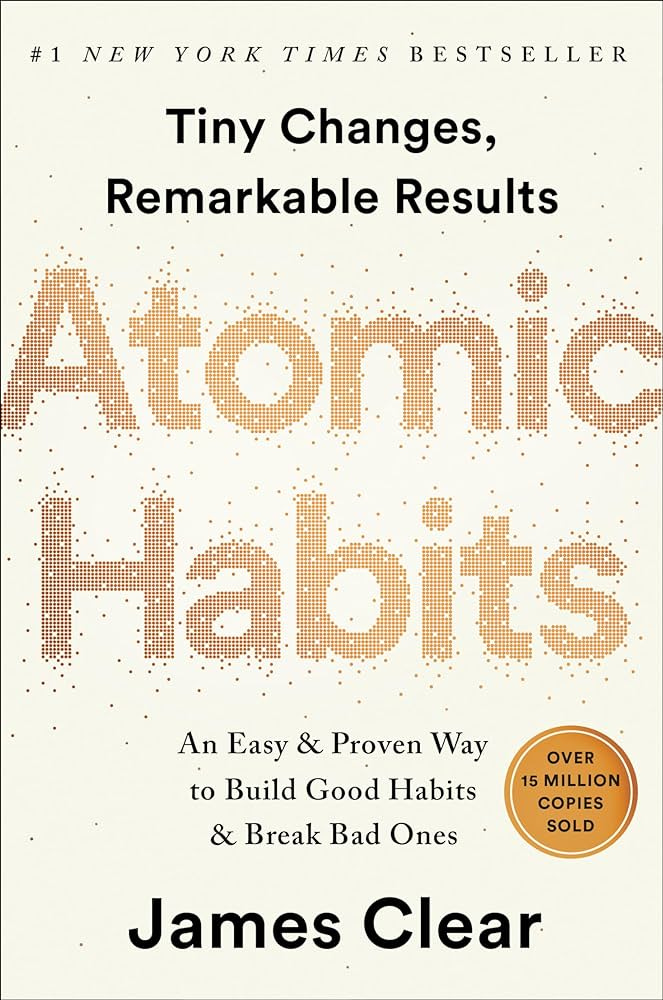🔤 Why 1 late meeting becomes 2
How to stop the chaos and take control of your time
Hey there! I’m Robert. Welcome to a free edition of my newsletter. Every week, I share 1 piece of advice 📖, 1 breakthrough recommendation 🚀, and 1 challenge 💥 to help leaders in tech achieve a growth mindset, transform their communication & influence, and master their emotions. Subscribe today to become the person and leader that people love, respect, and follow.
I’ve been waking up at 3 AM for the past few months.
It’s been thoroughly enjoyable.
It keeps me sane actually.
Right now I’m working on a few things:
Pushing my rock climbing plateaus
Leading a 1600+ engineer transformation at my day job
Working through customer development for my startup to find PMF (Product Market Fit)
I can happily say I’m making progress on all of the above.
But it does come at a cost.
80 hour work weeks are normal.
No parties, no junk food.
No late nights.
No doom scrolling.
And—no guilt or fear of missing out.
Just me, my training, my laptop, my tea, my purpose, and my dedication.
So I’m pretty strict with my schedule.
Despite that, I’ve been feeling off my game.
I feel I’ve been slipping.
It sucks.
Over the past two weeks, I’ve been running 5 minutes late to meetings—multiple times.
One late meeting, becomes two late meetings.
That might sound small, but for me, it’s a red flag.
A crack in the foundation.
I hate being late.
It makes me feel like I’m being careless with other people’s time. I dislike disrespecting other people’s time like that.
I’ve been embarrassed about it.
I felt friction in my progress.
I’m in a valley between local progress maximas.
Not enough progress velocity.
Chaos is creeping in again. Entropy in the system. Shit.
My calendar is leaning reactive, not intentional.
Luckily my co-founder noticed and gave me a heads up to check in with my planning rituals. (Shoutout Jonathan, thanks man)
Today I’m going to go over time management, planning, and what to do when the plan goes to shit.
🔤 This Week’s ABC
Advice: 3 levels of planning to make progress on my goals
Breakthrough: The one book you need to read yesterday
Challenge: Audit your time
📖 Advice: 3 Levels of Planning
“You do not rise to the level of your goals. You fall to the level of your systems.”
—James Clear
When you’re working 80+ hours a week, everything needs to earn its place on your calendar.
That includes sleep.
That includes climbing.
That includes joy (touching rocks for me).
You even need to plan for planning.
That’s actually the key to time management.
Plan for planning.
And do it.
Here are my main 3 simple planning rituals.
Lately I’ve been skimping on the daily planning at my own detriment. (Silly me. Stick to the plan.)
I start quarterly.
Quarterly: Check The Compass
Every quarter, I have a 45 minute session in my calendar that I block off to review my progress against my goals.
I check my compass to see if I need to make tweaks.
Then I make tweaks, and keep moving forward.
Time commitment: 45 minutes every 12 weeks
Todos:
Set/review 1–3 quarterly goals (e.g., “Grow newsletter to 50K subs in 1 year”)
Identify big levers to move that goal (e.g., guest posts, partnerships)
Reflect: What’s working? What’s noise?
Plan and commit for the next quarter
Weekly: Does This Make Sense?
Time commitment: 15 minutes every Sunday
Todos:
I review my to-do list with my quarterly goals in mind
I use the Eisenhower Matrix to prioritize (urgent vs important)
I block my calendar for the week with tasks that matter—not just meetings
My Non-Negotiables:
2 meeting-free mornings for deep work.
Decline low-leverage meetings politely. If there’s no agenda, no goal—it’s a no.
Move unnecessary syncs into async via DMs or Loom style videos
Daily: Does This Make Sense?
Time commitment: 15 minutes every morning
Review my top 3 priorities for the day.
Check my calendar—again, eliminate anything non-essential.
Close my eyes. Breathe. Reflect on what I’m grateful for.
I’ve found that if you don’t start your day with intention, the world will hand you its own.
The daily planning helps you stay grounded and make last minute adjustments.
Lately this has been my general weekday schedule:
3–6 AM: Deep work on epistemicme.ai. The world is silent. I call this “The Kobe Block.” No distractions. No excuses.
6 AM–2 PM: Day job at Dayforce. I solve hard problems with great people.
2–4 PM: Climbing, gym, or hanging with friends. This is play. Play keeps me healthy and human.
4–7 PM: More startup time.
Note: Not every single day is cleanly laid out like this.
When the plan goes to shit
Getting pulled into escalations and fires happens for sure.
Lately I’ve been getting pulled into so many escalations and fires.
Looking at this with a systems lens, when I get pulled into fires—my plan effectively goes to shit.
So what happens when a plan goes to shit?
I like to take a breath, quickly remind myself of much worse times in life, then…
Re-plan.
Upon reflection I realized I haven’t been intentional about re-planning after getting pulled into fires.
I realized—I didn’t intentionally bake “time for re-planning” into my system.
Which meant…
One off day turned into two. Then three.
One slipped meeting turns to two. Then three.
Mistakes weren’t just happening.
They were compounding.
When mistakes compound, you are more likely to make more mistakes.
So take the time to get out from underneath the planning debt these fires created.
Re-plan.
It’s that simple.
My new thinking:
If progress is non-linear, planning must be non-linear too.
Mistakes were made.
But they will not continue to be made. Lesson learned.
I’m now going to commit to re-planning after taking care of fires.
I believe that should solve this systematically.
Because as James Clear said… “You do not rise to the level of your goals. You fall to the level of your systems.”
Gotta keep maintaining the systems.
🚀 Breakthrough: “Atomic Habits” by James Clear
Speaking of James Clear…
His book "Atomic Habits" is a must-read for anyone looking to make meaningful changes in their life, including how they manage their schedule.
It changed my life and the way I think about building habits.
Big changes come from small adjustments—like committing to time blocking or reducing the number of meetings you attend—you can create a schedule that works for you, rather than against you.
💥 Challenge: Audit Your Time
Schedule Time, To Schedule Time: Start by creating a daily and weekly recurring calendar event that you use to honor weekly and daily planning. You will feel like the “I totally got this” Dog instead of the “This is Fine” Dog burning in hell.
Prioritize What Matters: Identify the key tasks that align with your goals. Schedule these tasks first, and let everything else fit around them. Use the Eisenhower Matrix.
Use Time Blocking: Allocate specific time blocks for focused, deep work. Protect these blocks from interruptions and distractions. You need to plan these ahead of time if you’re in any profession that requires deep thinking
You got this!
Liked this article?
💚 Click the like button.
Feedback or addition?
💬 Add a comment.
Know someone that would find this helpful?
🔁 Share this post.
P.S. If you haven’t already checked out my other newsletter, ABCs for Building The Future, where I reflect on my founder’s journey building a venture in the open. Check out my learnings on product, leadership, entrepreneurship, and more—in real time!
P.S.S. Want reminders on entrepreneurship, growth, leadership, empathy, and product?
Follow me on..









Hey Robert - really interesting - would love to speak about Epistemicme :) Will find you on LI!